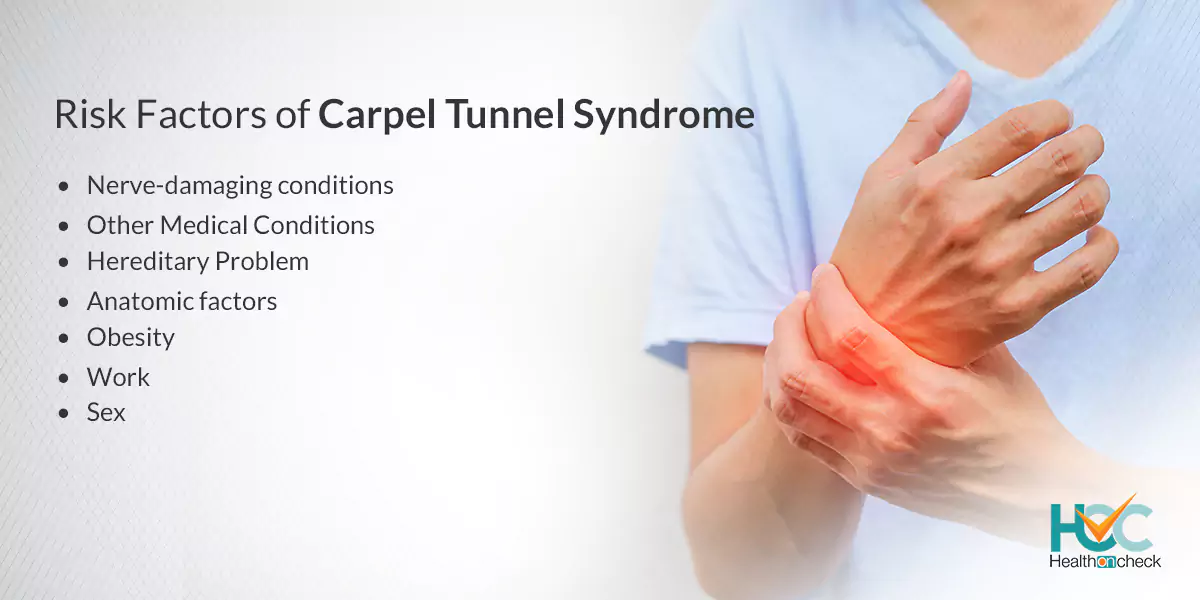All about Carpal Tunnel Syndrome

What is Carpel Tunnel Syndrome?
Carpal tunnel syndrome is an ailment that causes pain, numbness, tingling, and weakness in the wrist and hand, and it’s caused by pressure on the median nerve. The carpal tunnel is basically the narrow passageway that is bordered by bones and ligaments on the palm side of the hand. When the median nerve is compressed, it can cause tingling, numbness, and weakness in the hand, wrist, and arm. It affects people who use their wrists and hands repeatedly at work and play are most likely to get affected by it. Anyone can get carpel tunnel syndrome, but people below the age of 20 are mostly not affected by it. The risk of developing carpal tunnel syndrome increases with age.

What are the Symptoms of Carpel Tunnel Syndrome?
Carpal tunnel syndrome symptoms usually start gradually and the early symptoms of it include:
- Tingling or numbness: In the earlier stage of carpel tunnel syndrome, you may feel tingling and numbness in the fingers or hand. Normally, the thumb and index, middle, or ring fingers are affected, barring the little finger. You might feel the sensation of an electric shock in the affected parts.
- Weakness: You may feel weakness in the hand and drop objects. This may be because of the numbness in the hand or weakness in the thumb’s pinching muscles, which are also controlled by the median nerve.
If the condition is persistent then you may experience symptoms such as
- Decreased feeling in the fingertips.
- Difficulty using the hand for usual tasks, such as:
- Holding small objects.
- Handling a steering wheel to drive.
- Holding a book to read.
- Writing using fingers.
- Typing a computer keyboard.
As carpal tunnel syndrome deteriorates, symptoms become more relentless and give rise to symptoms like:
- Weakening the hands.
- Incapability to carry out tasks that need delicate motions like buttoning a shirt.
- Dropping objects because of weak hands.
In more severe conditions, the muscles at the base of the thumb visibly shrink in size, a condition known as atrophy.
What are the Causes of Carpel Tunnel Syndrome?
Carpal tunnel syndrome usually occurs when the space (the carpal tunnel) in the wrist becomes narrow. This crates pressure on the median nerve and tendons, making it to swell, and cuts off sensation in the fingers and hand.
Whatsoever squeezes or irritates the median nerve in the carpal tunnel space may result in carpal tunnel syndrome. A wrist fracture might narrow down the carpal tunnel and aggravate the nerve, along with the swelling and inflammation caused by rheumatoid arthritis.

What are the Risk Factors of Carpel Tunnel Syndrome?
- Anatomic factors: A wrist fracture or dislocation, or arthritis that deforms the small bones in the wrist, may change the space inside the carpal tunnel and put pressure on the median nerve which may develop the risk of carpal tunnel syndrome. People who have smaller carpal tunnels are at more risk to get carpal tunnel syndrome.
- Sex: Women are more likely to get carpal tunnel syndrome as compared to men and it might be because the carpal tunnel area is comparatively smaller in women than in men.
- Nerve-damaging conditions: People with some chronic illnesses like diabetes have more risk of nerve damage, including damage to the median nerve that may result in carpal tunnel syndrome.
- Hereditary Problem: If you have a family member who has carpal tunnel syndrome then your chances of getting carpal tunnel syndrome increases.
- Obesity: Being obese is one of the main risk factors for carpal tunnel syndrome.
- Other Medical Conditions: A few medical conditions, like menopause, thyroid disorders, kidney failure, and lymphedema, may increase the chances of carpal tunnel syndrome.
- Work: People who use their wrists and hands repeatedly at work and play have a high chance of getting affected by it.
What are the Complications of Carpal Tunnel Syndrome?
If you have carpal tunnel syndrome and don’t get it treated then the symptoms may continue for a long period and get worse with time. It may also keep going and then come back if not cured. If you are diagnosed early, it is easier to treat it.
Permanent muscle damage is the main complication of carpal tunnel syndrome along with your hand not working the way it should. Early treatment is important to save yourself from long-term complications of carpal tunnel syndrome.
How is Carpal Tunnel Syndrome Diagnosed?
Here are some tests to diagnose carpal tunnel syndrome:
- Tinel’s Sign: Here the physician pats over the median nerve at the wrist to check whether it is producing a tingling sensation in the fingers.
- Wrist Flexion Test (or Phalen test): In this type of test, the patient is asked to rest his/her elbows on a table and let the wrist to fall forward without restrictions. People with carpal tunnel syndrome will feel numbness and tingling in the fingers within 1 minute. The more swiftly symptoms appear, the more severe the carpal tunnel syndrome.
- X-Rays: X-rays of the wrist may be taken to check if there is limited wrist motion or signs of arthritis or trauma.
- Electromyography (EMG) and Nerve Conduction Studies: These tests are done to determine how well the median nerve itself is working and how well it is controlling the movement of muscles.
What are the Treatment Options Available for Carpal Tunnel Syndrome?
The treatment for carpal tunnel syndrome depends on the symptoms and their severity. The treatment of carpal tunnel syndrome includes:
- Lifestyle changes: If you are having the symptoms constantly then it’s advisable to take breaks more frequently or do a bit less of the activities that are causing you pain.
- Exercises: Physical exercises like stretching or strengthening moves can ease the symptoms. Nerve gliding exercises can make the nerve move better within your carpal tunnel.
- Immobilization: Your doctor may advise you to wear a splint to keep your wrist from moving and to decrease pressure on your nerves. You can wear a splint at night to lessen the feeling of numbness or tingling in your fingers.
- Medication: Your doctor may prescribe you anti-inflammatory drugs or steroid shots to curtail swelling in the affected areas.
- Surgery: If your condition is not getting cured by physical exercise and medications then you might have to go for a surgery called carpal tunnel release that surges the size of the tunnel and decreases the pressure on your nerve.
Living with Carpel Tunnel Syndrome
Having carpal tunnel syndrome isn’t just a matter of discomfort and pain. Not being able to use your hands properly is a serious matter, as it can affect your living as you will find it difficult to do your job properly especially if it involves physical activity or even just carrying out your day-to-day activities and the pain from it may keep you awake at night.
Whom to Consult?
Visit your doctor if you have signs and symptoms of carpal tunnel syndrome that restrict your normal daily activities and sleep patterns. If you don’t take proper treatment then this condition may cause permanent nerve and muscle damage. Your doctor may ask you to go through some physical activities and give some medications to treat it and if the condition persists, surgery may be needed to cure the problem.




